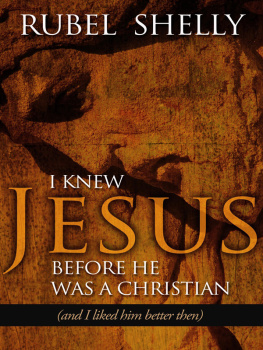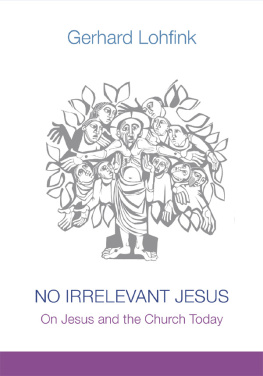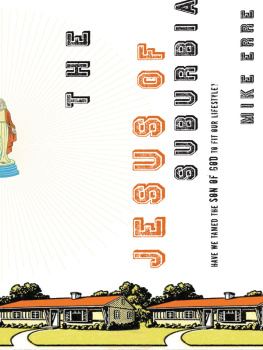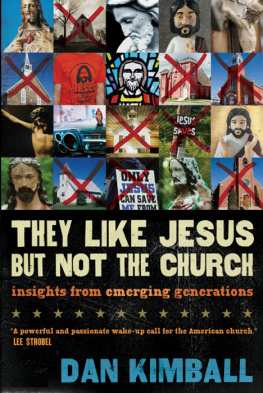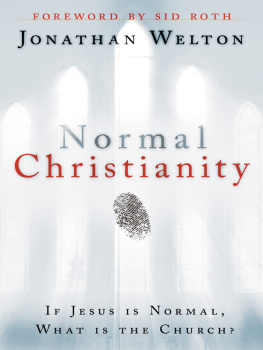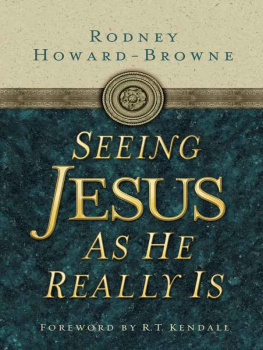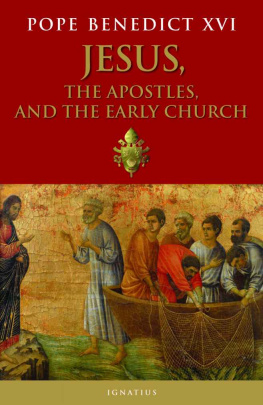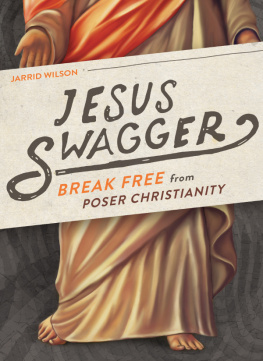... AND I LIKED HIM BETTER THEN
Unless otherwise indicated, Scripture quotations are from the New Revised Standard Version 1989 by the Division of Christian Education of the National Council of the Churches of Christ in the United States of America. Scripture quotations noted NIV are from The Holy Bible, New International Version. Copyright 1984, International Bible Society. Used by permission of Zondervan Publishers. Scripture quotations noted NLT are taken from the Holy Bible, New Living Translation, copyright 1996, 2004. Used by permission of Tyndale House Publishers, Inc., Wheaton, Illinois 60189. All rights reserved. Scripture quotations marked (CEV) are from the Contemporary English Version Copyright 1991, 1992, 1995 by American Bible Society. Used by permission. All rights reserved. Scripture quotations noted MSG taken from The Message. Copyright 1993, 1994, 1995, 1996, 2000, 2001, 2002. Used by permission of NavPress Publishing Group.
LIBRARY OF CONGRESS CATALOGING-IN-PUBLICATION DATA Shelly, Rubel.
I knew Jesus before he was a Christian :--and I liked him better then / Rubel Shelly.
p. cm.
Includes bibliographical references (p. ).
ISBN 978-0-89112-271-5
1. Mission of the church. 2. Jesus Christ--Person and offices. I. Title.
BV601.8.S44 2011
262.7--dc22
M 2011010671
Introduction
WHAT DOES THAT MEAN?
Religion has often suffered from
the tendency to become parochial,
self-indulgent, self-seeking.... It has
often done more to canonize prejudices
than to wrestle for truth; to petrify the sacred
than to sanctify the secular.
Abraham Heschel
I Knew Jesusbefore He Was a Christian... and I Liked Him Better Then? What in the world is that supposed to mean?
The title is my way of bringing to the fl oor for discussion a critical truth about Jesus of Nazareth: the Jesus of history and the Jesus of common public perception are two very different persons. My claim is that the church has represented Jesus so poorly during the past two thousand years that his fundamental attractiveness as Savior has been lost to many, many people.
One of the most glaring ways the church has represented Jesus poorly is the way Christians are dividedinto literally tens of thousands of denominations worldwide. The church has become laughable to the worldso laughable, in fact, that an online poll in 2005 named this joke from comic Emo Philips the funniest religious joke ever.
Once I saw this guy on a bridge about to jump. I said, Dont do it!
He said, Nobody loves me.
I said, God loves you. Do you believe in God?
He said, Yes.
I said, Are you a Christian or a Jew?
He said, A Christian.
I said, Me, too! Protestant or Catholic?
He said, Protestant.
I said, Me, too! What franchise?
He said, Baptist.
I said, Me, too! Northern Baptist or Southern Baptist?
He said, Northern Baptist.
I said, Me, too! Northern Conservative Baptist or Northern Liberal Baptist?
He said, Northern Conservative Baptist.
I said, Me, too! Northern Conservative Baptist Great Lakes Region, or Northern Conservative Baptist Eastern Region?
He said, Northern Conservative Baptist Great Lakes Region.
I said, Me, too! Northern Conservative Baptist Great Lakes Region Council of 1879, or Northern Conservative Baptist Great Lakes Region Council of 1912?
He said, Northern Conservative Baptist Great Lakes Region Council of 1912.
I said, Die, heretic! And I pushed him over.
As with much of the humor we create, the telling of Emos story produces laughter because people identify with it. Just plug in your own denomination and one or two of its idiosyncratic beliefs, and you will get a true feel for it. At first I laughed and toyed with this story, relaying it to others; however, the laughter eventually gave way to a feeling of profound sadness.
This sadness comes from seeing the name of Jesus so tarnished and sullied across the centuries that many do not even recognize the difference between Jesus and the tarnished picture Christianity has painted over the years.
How did the name of Jesus suffer such devastating blows over time? How did we get to the point where Christianity has become an institution, a set of dogmas, and a barren ritual rather than being associated wholly with the actions of God in Christ and his teachings? If the church is to have a witness in the post-Pentecost, post-Constantine, postmodern twenty-first century, we need to take immediate action, but it should also be thoughtful action born out of sincere and authentic questioning of our own flaws.
In Philipss joke about the two confused men on the bridge, the important thing is being rightand proving that others arent right. So the battle between church dogmas and rituals continues. And we wind up sounding like the little boy who declares, My daddy can whip your daddy! or pushing people off the bridge.
While Holy Scripture is quite clear on the identity and all-sufficiency of Christ as Savior, the things that produce the deep tribal divisions among followers of Christ are seldom all that fundamental. The divisions among Christians more often fall into the category of human interpretations and judgments that are put on par with the will of God.
This tendency of the human mind to blur the distinction between its judgments, on one hand, and the express commands of God, on the other, has bred both schism and bloodshed. Jesus quoted Isaiah on this point and rebuked what he called teaching human precepts as doctrines; in that same context, he went on to say that such a practice was anything but harmless and could result in rejecting the commandment of God in order to keep your tradition (Mark 7:69).
Jesus did not come to found a new religion that would generate still more human precepts masquerading as divine doctrine. He did not produce a creed or command us to write one. He came to reveal the Father and to declare that the kingdom rule of God is simultaneously at hand (i.e., nearby, available) and among you (i.e., already beginning to be realized, being witnessed in his ministry). Heaven knew that if we had an experience of God himself, we would never be the same. When Jesus appeared, people flocked to him

